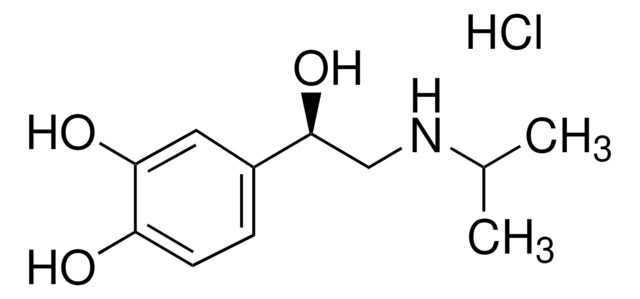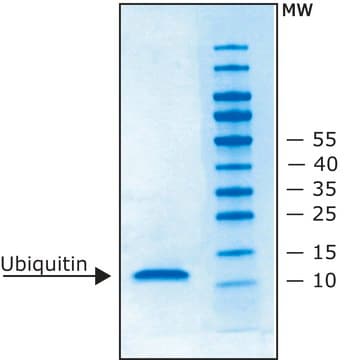SRP6133
Ubiquitin-K48 human
recombinant, expressed in E. coli, ≥85% (SDS-PAGE)
Se connecterpour consulter vos tarifs contractuels et ceux de votre entreprise/organisme
About This Item
Code UNSPSC :
12352200
Nomenclature NACRES :
NA.32
Produits recommandés
Source biologique
human
Produit recombinant
expressed in E. coli
Pureté
≥85% (SDS-PAGE)
Forme
liquid
Poids mol.
8.732 kDa
Conditionnement
pkg of 500 μg
Numéro d'accès NCBI
Conditions d'expédition
dry ice
Température de stockage
−70°C
Informations sur le gène
human ... RPS27A(6233)
Description générale
Ubiquitin is a small polypeptide that can be conjugated via its C-terminus to amine groups of lysine residue on target proteins. This conjunction is referred to as monoubiquitylation. Additional ubiquitin moieties can be subsequently conjugated to this initial ubiquitin, utilizing any one of the seven lysine residues on the surface of ubiquitin. The formation of these ubiquitin chains is referred to as polyubiquitylation. This tag-free recombinant form of human ubiquitin is engineered to have all available lysines mutated to arginines, except at position 48. This molecule, therefore, can only form polyubiquitin chains of K48 linkage type. Covalent attachment of ubiquitin to other proteins serves various functions, but its major role is to target cellular proteins for destruction. Cellular components that activate, transfer, remove, or simply recognize ubiquitin number in the hundreds, perhaps even in the thousands. In light of this complexity the ubiquitin pathway is ideal for a systems biology approach. Ubiquitin plays a very important role in regulated non-lysosomal ATP dependent protein degradation. The Ub-proteasome proteolytic pathway, which is a complex process, is implicated to be of great importance for regulating numerous cellular processes.
Forme physique
4 mg/mL in 50 mM Tris, pH 7.5, 150 mM NaCl, 10% glycerol.
Notes préparatoires
Centrifuge the vial prior to opening.
Code de la classe de stockage
13 - Non Combustible Solids
Classe de danger pour l'eau (WGK)
WGK 3
Point d'éclair (°F)
Not applicable
Point d'éclair (°C)
Not applicable
Certificats d'analyse (COA)
Recherchez un Certificats d'analyse (COA) en saisissant le numéro de lot du produit. Les numéros de lot figurent sur l'étiquette du produit après les mots "Lot" ou "Batch".
Déjà en possession de ce produit ?
Retrouvez la documentation relative aux produits que vous avez récemment achetés dans la Bibliothèque de documents.
Notre équipe de scientifiques dispose d'une expérience dans tous les secteurs de la recherche, notamment en sciences de la vie, science des matériaux, synthèse chimique, chromatographie, analyse et dans de nombreux autres domaines..
Contacter notre Service technique






